 Welcome to the unemployment network.
Welcome to the unemployment network.
Cisco announced this week the imminent layoff of some 6,500 of its employees in a desperate bid to boost the company’s stock price and get back on the good side of Wall Street, angered by a series of acquisition blunders by the company’s management and a growing loss of confidence in the future of some of the company’s legacy broadband products.
The cuts at Cisco, which include 2,100 employees who took a voluntary early-retirement program, were announced July 18th, with tepid applause from many investors who don’t believe the company slashed nearly enough positions to get the company’s cash on hand up (although it currently amounts to nearly $30 billion, much of it stashed in overseas accounts). They wanted at least 10,000 members of Cisco’s “human network” to be cashiered.
 While thousands of employees pay the ultimate price for the company’s low stock price, the executives that steered Cisco’s enormous business networking ship onto the rocks are still firmly at the helm. In fact, Cisco CEO John Chambers received compensation valued at $18.9 million in fiscal 2010, according to documents filed with the U.S. Securities and Exchange Commission. His total package is up 33% from 2009, when he received compensation valued at $14.2 million. That’s quite a reward for what Wall Street perceives as utter failure.
While thousands of employees pay the ultimate price for the company’s low stock price, the executives that steered Cisco’s enormous business networking ship onto the rocks are still firmly at the helm. In fact, Cisco CEO John Chambers received compensation valued at $18.9 million in fiscal 2010, according to documents filed with the U.S. Securities and Exchange Commission. His total package is up 33% from 2009, when he received compensation valued at $14.2 million. That’s quite a reward for what Wall Street perceives as utter failure.
Under Chambers’ watch, Cisco overspent top dollar for Pure Digital Technologies, the San Francisco company responsible for the Flip handheld video camera. You know, the one now discontinued by Cisco less than two years after acquiring the company for $590 million (and up to $15 million in retention bonuses for key executives.) In fact, Cisco may still be paying off a deal for a product consumers have now long-since forgotten.
Currently, there is no indication Chambers will be significantly punished for the various blunders under his watch. But his latest decision to jettison thousands of workers has thrown a high-pressure, well-funded lobbying campaign on behalf of large corporations trying to get a tax break repatriating billions stashed in overseas bank accounts, into chaos.
Cisco’s CEO was among the loudest supporters of the tax slash for corporate entities who have parked much of their free cash overseas to avoid Uncle Sam’s tax bite. Chambers has publicly said he wants to bring $30 billion in company profits back to the States, but only if he can do so at a discount. Ironically, Chambers promoted the tax holiday as a job creator, claiming Cisco would add as much as 10 percent to his workforce if the deal was approved.
That promise doesn’t mean much after this week’s employee clear-cutting by the networking company.
It’s certainly upsetting the lobbying apple cart in Washington, potentially ruining the Money Party for other super-sized corporations looking for a tax break handout.
Companies like Duke Energy said the $1.3 billion it wants to repatriate to the U.S. would create 15,000 to 20,000 jobs. But many Democrats remain skeptical the promised jobs will ever materialize.
Rep. Lloyd Doggett from Texas notes we’ve been here before. Back in 2004, HP got a tax break to bring back almost $15 billion with the promise the company would create jobs. Instead, it slashed its workforce by 14,500 employees in a year.
“As a leading proponent of this corporate tax giveaway, Cisco is announcing massive layoffs instead of investing in American job creation with the billions it already has available,” Doggett said. “Once again, it is clear that large multinational corporations have no intention of using any repatriation tax windfall to create jobs.”
This left the WinAmerica Campaign, a corporate-funded group promoting the tax cut, scrambling to deliver an adjusted message to Congress.
Doug Thornell, a spokesman for the group, told Bloomberg News the effort “isn’t about just one company.”
“It’s about the benefit to the broader economy,” he said. “It’s whether we continue a failed policy that lets a trillion dollars languish overseas when our economy desperately needs the help.”
With up to 6,500 former employees about to join unemployment lines, Cisco isn’t doing much to help, especially when those responsible are not held accountable for the mistakes that left the company in its ultimate predicament.
[flv width=”360″ height=”290″]http://www.phillipdampier.com/video/Bloomberg Henderson Says Job Cuts Not Enough for Cisco’s Problems 7-18-11.mp4[/flv]
Bloomberg News talks to a Wall Street analyst who doesn’t think Cisco has cut nearly enough jobs to get the company worthwhile for investors again. (5 minutes)


 Subscribe
Subscribe








